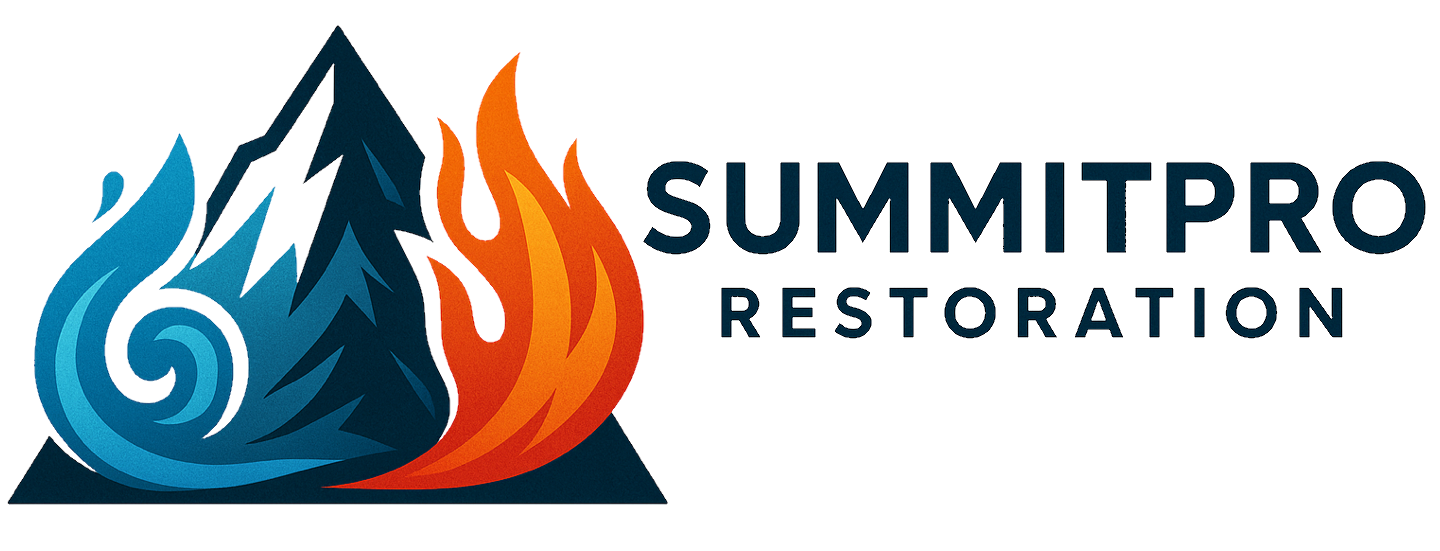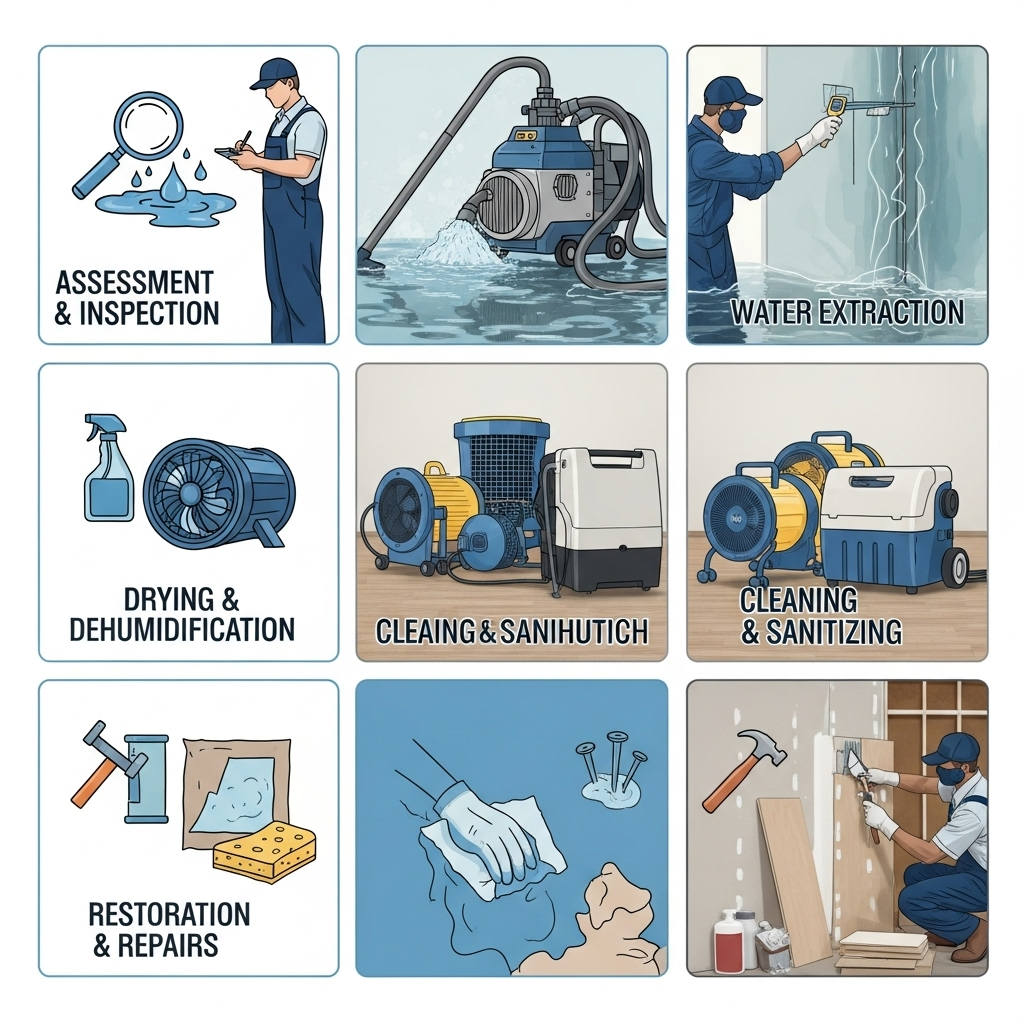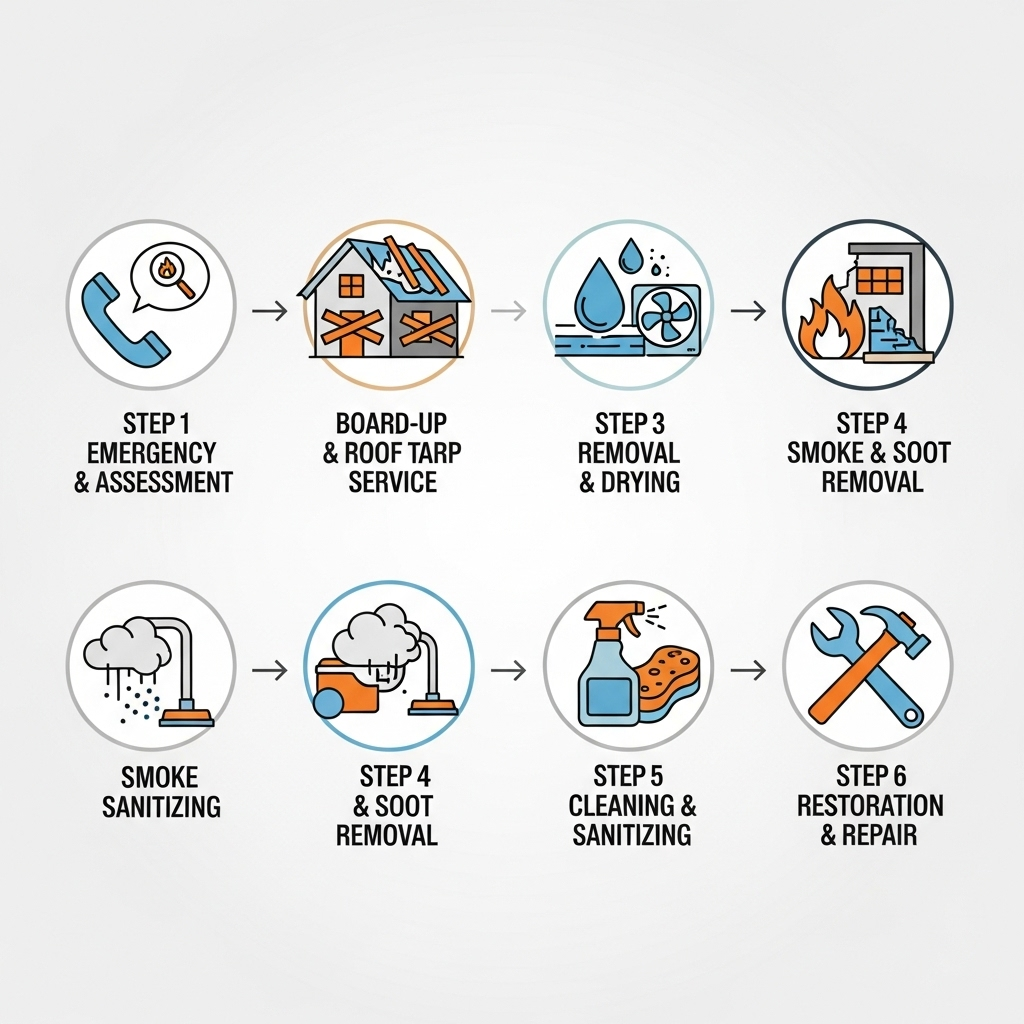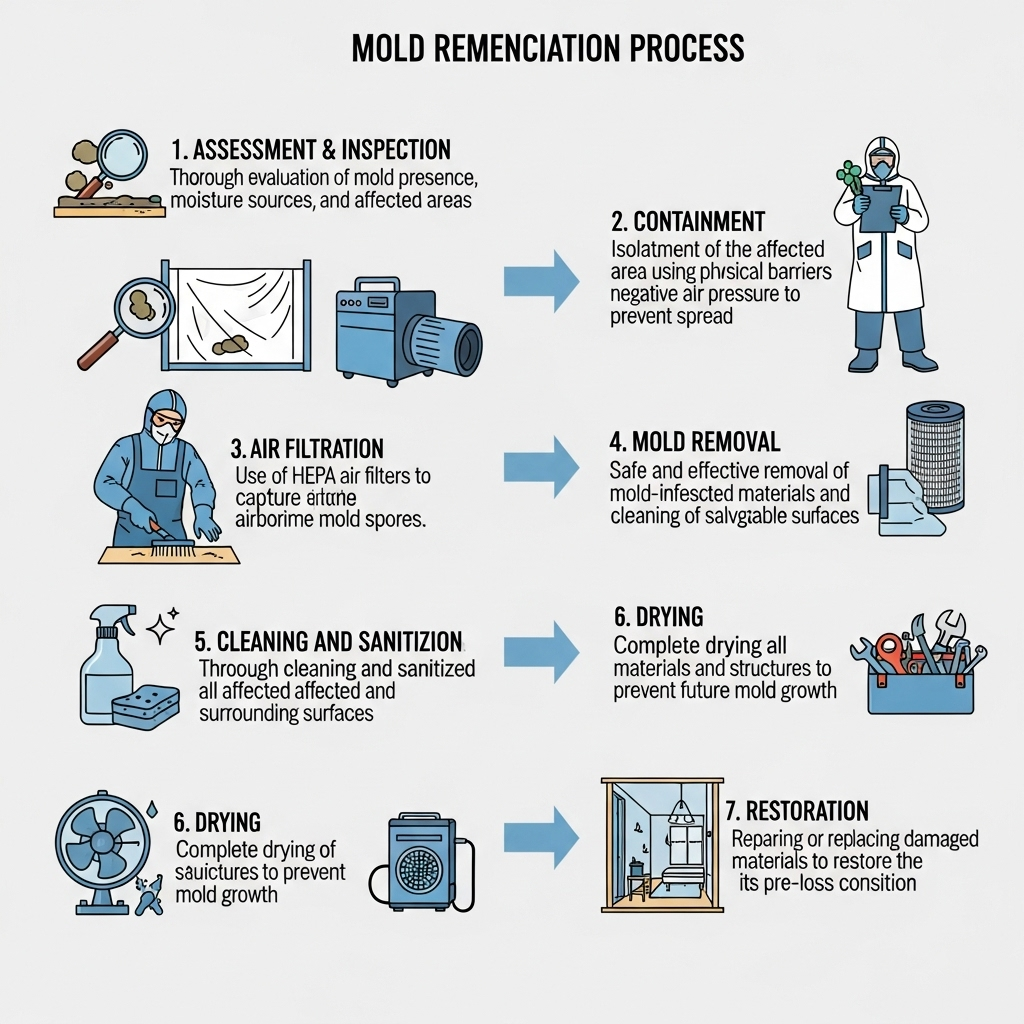Frequently Asked Questions
Section 1: Emergency & General Questions
How quickly can you get here?
We typically can arrive on site within 90 minutes of an emergency request.
Are you available 24/7 for emergencies?
Yes we offer 24/7 emergency services.
What areas do you serve?
New York Counties
New York
Bronx
Queens
Kings
Westchester
Putnam
Rockland
Orange
Sullivan
Ulster
Dutchess
Connecticut Counties
Fairfield
New Haven
Litchfield
Middlesex
Can I clean this up myself?
Attempting a DIY cleanup often only addresses the visible mess, leaving hidden moisture trapped in walls or soot deep within materials. A professional restoration company uses specialized equipment and scientific methods to find and eliminate these hidden threats. This prevents costly long-term issues like structural rot, hazardous mold growth, and permanent odors, ensuring your home is truly safe and clean.
Section 2: The Restoration Process
What are the steps of the restoration process for water damage?
What are the steps of the restoration process for fire and smoke damage?
What are the steps of the restoration process for mold remediation?
How long will the entire restoration take?
The duration of the restoration process varies greatly on the extent of the damage, in minor cases the restoration process can be completed in a few days in cases with substantial damage this could take months.
What happens to my furniture and personal belongings?
A restoration pack-out is the process of professionally inventorying, packing, and moving your contents from a damaged property to a secure facility for specialized cleaning and storage. This protects your belongings and clears the way for unobstructed repairs to your home. Once the property is restored, the team performs a "pack-in," carefully returning and unpacking your items to their original rooms and locations. This comprehensive service ensures your possessions are handled with care from start to finish.
Do I need to be home during the restoration work?
You will need to be home during the initial assessment and final sign-off.
How will you keep me updated on the progress?
You will be assigned a project manager that will provide you will daily updates. We understanding having piece of mind about the restoration process for your home is important.
Section 3: Insurance & Costs
Do you work with all insurance companies?
Yes, we work with all insurance companies and will help guide you though the process.
How does the insurance claim process work?
First, you file a claim with your insurance provider, who will assign an adjuster to assess the damage to your property. The restoration company then provides the adjuster with a detailed scope of work and a professional estimate for all necessary repairs. Once the scope and costs are approved by your insurer, they issue payment (often in stages), allowing the restoration work to begin and ensuring your property is returned to its pre-loss condition as covered by your policy.
Do I pay you, or does my insurance company pay you?
We will bill your insurance company, no payment is needed upfront to start the restoration process on your home.
Do you offer free estimates?
Yes, we provide a free, no-obligation on-site inspection and detailed estimate for the restoration work.
Section 4: Service-Specific Questions
For Water Damage:
What’s the difference between clean water, gray water, and black water?
Clean water comes from a sanitary source like a broken supply line and poses no immediate health threat. Gray water is slightly contaminated, originating from sources like washing machines or dishwashers, and may contain bacteria. Black water is grossly unsanitary, typically from sewage backups or floodwaters, and contains dangerous pathogens that require specialized safety protocols for removal.
How do you dry my property completely?
We use a scientific drying process that begins with extracting all standing water. Next, we strategically place commercial-grade equipment, including powerful air movers to accelerate evaporation and industrial dehumidifiers to pull moisture directly from the air. Throughout this process, our technicians use specialized moisture meters to monitor the moisture levels in walls, floors, and other materials, ensuring your property is returned to its pre-damage dry standard.
How long does it take for a structure to dry?
While a typical drying process takes between three and five days, the exact timeline can vary. Factors such as the type of materials affected, the level of water saturation, and the duration of exposure all play a role in determining how long it will take to dry your structure completely.
Will my water-damaged wood floors be salvageable?
The salvageability of water-damaged wood floors depends on several factors, including the type of wood, how long it was exposed to water, and the water category. We utilize advanced techniques, such as specialized floor drying mat systems, to maximize the chances of saving them. Our team will perform a thorough assessment to determine the most effective restoration plan for your specific flooring.
For Fire Damage:
How do you get rid of the smoke smell?
Removing smoke odor requires a comprehensive approach because the smell penetrates deep into materials. We use advanced deodorization techniques such as thermal fogging, which neutralizes odor particles, and deploy specialized equipment like ozone treatments and hydroxyl generators. These technologies safely and effectively eliminate lingering smoke molecules from the air and from within porous surfaces, ensuring the smell is gone for good.
What is the difference between smoke and soot cleanup?
Smoke and soot are related but require different cleanup strategies. Soot refers to the physical residue left behind, which can be dry and powdery or oily and sticky, depending on what materials burned. Our team identifies the type of soot to select the correct cleaning agent and method. Smoke cleanup focuses on eliminating the invisible, odor-causing particles that have penetrated surfaces and the air itself, which requires specialized deodorization techniques.
Can my electronics and documents be saved after a fire?
Yes, many electronics and documents can be saved after a fire, but they require immediate and specialized attention. We have in-house capabilities and also partner with experts who use proven methods, such as meticulous cleaning for electronics and vacuum freeze-drying for documents, to restore these sensitive items and prevent further damage.
For Mold Remediation:
Is all mold dangerous?
While some mold species are more hazardous to health than others, all types of mold can cause allergic reactions and respiratory issues. Furthermore, any active mold growth will progressively damage the materials it is growing on, compromising your home's structural integrity. For these reasons, we recommend that any visible mold growth be addressed professionally to protect both your health and your property.
Can’t I just use bleach to kill mold?
Using bleach on mold is a common misconception and is not an effective long-term solution. Bleach can kill surface mold on non-porous materials, but it does not penetrate porous surfaces like drywall or wood where the mold's roots are. Additionally, the process of scrubbing can release mold spores into the air, and the water content in bleach can actually feed the remaining mold, leading to its return.
What does "mold remediation" actually involve?
Mold remediation is a systematic process designed to safely remove mold and prevent its return. Our process begins with setting up containment barriers to isolate the affected area and prevent cross-contamination. We then use HEPA air filtration devices to capture airborne spores while we carefully remove all mold-impacted materials. Finally, we clean, disinfect, and treat the remaining surfaces to ensure your property is clean, safe, and free of mold.
Section 5: About Our Company & Why Choose Us
Are you licensed and insured?
Yes, we are licensed and insured in Connecticut and New York for your protection.
What kind of training and certifications do your technicians have?
Our firm is Institute of Inspection, Cleaning and Restoration certified, and our technicians hold multiple certifications including Water Restoration Technician, Fire and Smoke Restoration Technician, and Mold Remediation Specialist.



